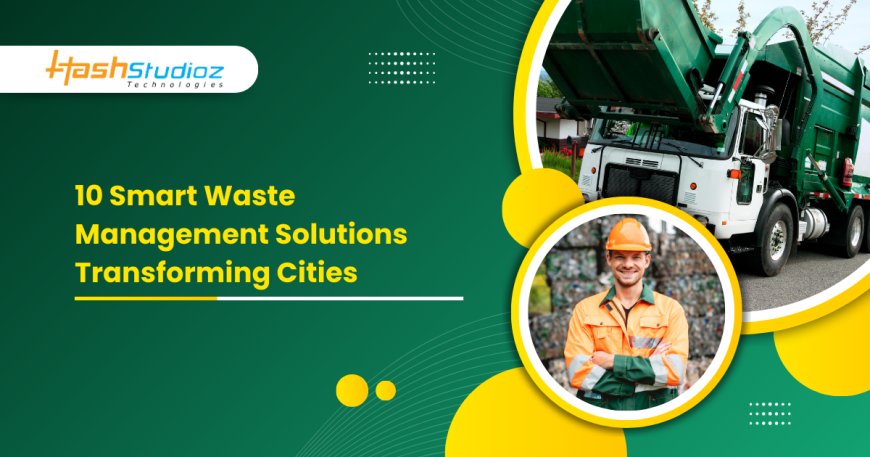10 Smart Waste Management Solutions Transforming Cities
Discover 10 smart waste management solutions transform cities with innovative technology, improving efficiency, and creating a sustainable future.

Waste management is one of the most pressing challenges that urban areas face today. As cities continue to grow, the need for effective and efficient waste collection and disposal becomes more critical. According to a report by the World Bank, global waste generation is expected to increase by 70% by 2050, with cities being the primary contributors. In response, smart waste management solutions are revolutionizing how cities handle waste, making processes more efficient, sustainable, and cost-effective.
This article explores 10 smart waste management solutions that are transforming urban areas, highlighting the role of waste collection monitoring and innovative technologies that support these solutions.
1. Smart Waste Bins and Sensors
What Are Smart Waste Bins?
Smart waste bins are equipped with sensors that monitor the fill levels of the bin in real-time. These bins send data to waste collection teams, informing them when the bins need to be emptied, and optimizing the collection schedule.
Benefits of Smart Waste Bins:
-
Reduced operational costs: Bins are only emptied when necessary, reducing unnecessary pickups.
-
Efficient waste collection: Data-driven collection schedules minimize the risk of overflows or missed pickups.
-
Environmental impact: Reduces carbon emissions by optimizing collection routes.
Examples:
Bigbelly is a leading provider of smart waste and recycling bins. These bins have solar-powered compactors that compress waste and send data about waste levels to collection teams.
Waste Collection Monitoring:
These bins provide essential waste collection monitoring data that helps cities efficiently plan collection schedules and ensure timely pickups.
2. IoT-Enabled Waste Management Systems
How IoT Improves Waste Management
The Internet of Things (IoT) enables waste management systems to communicate in real-time. IoT devices monitor waste levels, track garbage truck routes, and provide valuable data on the performance of waste management operations.
Benefits of IoT in Waste Management:
-
Data-driven decision-making: Real-time data helps improve collection schedules and optimize waste processing.
-
Predictive maintenance: IoT sensors help predict when equipment (like garbage trucks or waste compactors) needs maintenance.
-
Waste reduction: Insights from IoT systems can help identify areas for waste reduction and recycling.
Examples:
Rubicon Global is a waste management company that uses IoT technology to optimize waste collection and recycling programs, making waste management smarter and more sustainable.
3. Automated Waste Collection Trucks
What Are Automated Waste Collection Trucks?
Automated waste collection trucks, also known as autonomous waste collection vehicles, use technology like GPS, sensors, and artificial intelligence (AI) to navigate and pick up waste with minimal human intervention.
Benefits:
-
Increased efficiency: Automated trucks reduce the need for human labor and increase the speed of waste collection.
-
Safety: These trucks can operate in hazardous environments, minimizing risks to workers.
-
Cost savings: Reduced labor costs and optimized fuel consumption lead to significant savings.
Examples:
Volvo and Scania have developed autonomous waste collection trucks, which are already being tested in several European cities, like Copenhagen and Stockholm.
4. Waste-to-Energy (WTE) Technology
What Is Waste-to-Energy?
Waste-to-energy technology involves converting non-recyclable waste into usable energy, such as electricity or heat. This solution reduces the need for landfills and incinerators while providing an alternative energy source.
Benefits:
-
Energy production: WTE plants generate power from waste, reducing reliance on fossil fuels.
-
Waste reduction: This process diverts waste from landfills, minimizing environmental impact.
-
Sustainability: Helps cities achieve their sustainability goals by reducing waste and promoting clean energy.
Examples:
Covanta operates WTE plants worldwide, processing thousands of tons of waste to generate energy. Cities like San Diego and New York have adopted this technology to manage waste more effectively.
5. Smart Recycling Stations
How Do Smart Recycling Stations Work?
Smart recycling stations are equipped with sensors, cameras, and AI to improve the recycling process. These stations sort recyclable materials automatically, making recycling more efficient and accurate.
Benefits:
-
Increased recycling rates: Automating the sorting process ensures more materials are recycled properly.
-
Reduction in contamination: Smart stations help reduce contamination, which is a common problem in traditional recycling.
-
Real-time monitoring: Waste collection teams can monitor the status of the stations and ensure they are serviced regularly.
Examples:
ZenRobotics has developed AI-powered robots that sort recyclables more efficiently than humans, reducing contamination and increasing recycling rates.
6. AI-Powered Waste Sorting Systems
What Is AI Waste Sorting?
AI-powered waste sorting systems use machine learning algorithms and robots to automatically sort waste into categories like plastics, metals, and organic waste. These systems can identify and separate different types of waste with high precision.
Benefits:
-
Efficiency: AI can sort waste much faster and more accurately than humans.
-
Reduced labor costs: Automated sorting systems reduce the need for manual labor.
-
Higher recycling quality: The accuracy of AI-based systems results in higher-quality recyclables.
Examples:
AMP Robotics has developed an AI-powered robotic system that sorts recyclables, improving recycling rates and reducing contamination.
7. Waste Collection Monitoring Platforms
What Is Waste Collection Monitoring?
Waste collection monitoring platforms use real-time data to track the location of waste collection trucks, monitor their routes, and check whether they are following the most efficient paths.
Benefits:
-
Optimization of collection routes: Ensures that garbage trucks follow the most efficient paths, reducing fuel consumption and emissions.
-
Real-time tracking: Provides updates on collection status and truck locations.
-
Resource management: Helps waste management companies optimize the allocation of resources like trucks and workers.
Examples:
WasteLogics is a cloud-based waste management solution that provides waste collection monitoring, helping businesses and municipalities track waste collection performance and improve service delivery.
8. Sustainable Waste Processing Plants
What Is Sustainable Waste Processing?
Sustainable waste processing involves utilizing eco-friendly technologies to recycle or process waste in ways that minimize environmental impact. These plants often use advanced mechanical-biological treatment (MBT) or anaerobic digestion to process organic waste.
Benefits:
-
Reduced environmental footprint: Sustainable processing technologies reduce emissions and minimize harmful pollutants.
-
Energy production: Some processes, like anaerobic digestion, can produce biogas, which can be used for energy.
-
Cost savings: These plants reduce the need for landfill space and improve waste management efficiency.
Examples:
SUEZ Recycling and Recovery operates several sustainable waste processing plants that turn waste into useful products such as compost and biogas.
9. Blockchain for Waste Management
How Blockchain Improves Waste Management
Blockchain technology can be used to track and verify the entire lifecycle of waste, from collection to disposal or recycling. This ensures transparency, accountability, and better reporting of waste management activities.
Benefits:
-
Transparency: Blockchain provides an immutable record of waste transactions, making it easier to track waste disposal and recycling.
-
Accountability: Waste management companies can provide verifiable proof of their environmental impact.
-
Increased trust: Blockchain enhances trust between stakeholders, such as waste management companies, local governments, and citizens.
Examples:
WASTR is a blockchain-based platform that connects waste generators with waste collectors and recyclers, ensuring transparent and efficient waste disposal.
10. Smart Landfills with Gas Recovery
What Are Smart Landfills?
Smart landfills use advanced sensors and monitoring systems to track waste decomposition and manage landfill gas. These systems ensure that the landfill is being managed efficiently and that harmful emissions are minimized.
Benefits:
-
Gas recovery: Capturing and using landfill gas for energy generation reduces greenhouse gas emissions.
-
Environmental monitoring: Real-time data on landfill conditions helps prevent environmental contamination.
-
Sustainability: Smart landfills help reduce the negative environmental impact of landfills and contribute to renewable energy production.
Examples:
Waste Management Inc. operates smart landfills equipped with gas recovery systems, generating renewable energy and reducing environmental impact.
Conclusion
As cities continue to grow, managing waste efficiently is essential for creating sustainable urban environments. The 10 smart waste management solutions discussed in this article offer innovative approaches to waste collection, processing, and recycling, helping cities tackle the growing waste problem. Technologies such as waste collection monitoring, AI sorting systems, and waste-to-energy plants are reshaping the waste management industry, making it more efficient and environmentally friendly.
These solutions are not just transforming waste management; they are also contributing to the sustainability goals of cities worldwide. By adopting these technologies, cities can reduce their carbon footprint, optimize resource use, and create cleaner, healthier environments for future generations.
What's Your Reaction?



















